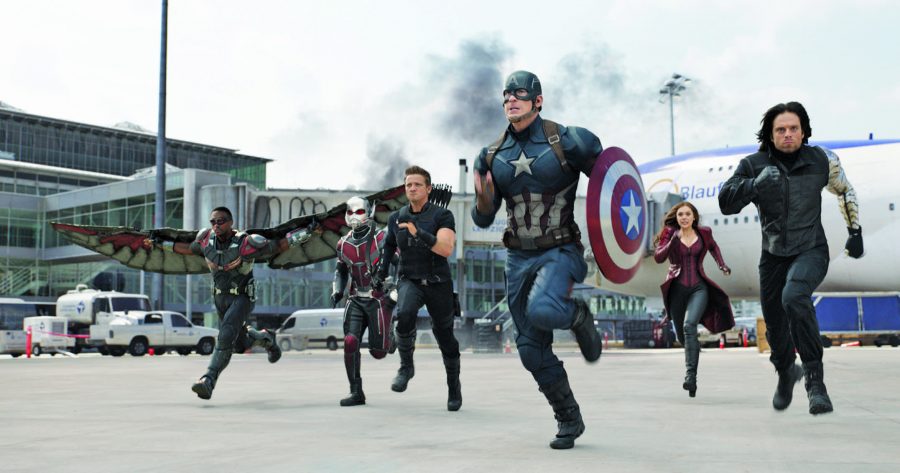‘Captain America: Civil War’ review
May 12, 2016
In 1865, the Confederate South surrendered to Union forces to finally bring an end to the American Civil War. In the Marvel Cinematic Universe (MCU) however, the term “Civil War” has a different connotation. On May 6 the highly anticipated film “Captain America: Civil War” debuted in theaters.
Being a hardcore Marvel buff, I had a difficult time composing myself as the opening Marvel title card engulfed the screen. For any readers who have not yet seen the film, don’t worry about reading any spoilers in this review.
Since the premiere of “Iron Man” in 2008, the MCU franchise has been structured in “phases” that culminate in an Avengers movie. “Captain America: Civil War” marks the beginning of Phase III, which will conclude in May of 2019 with the premiere of “Avengers: Infinity War Part II.”
Similar to the comic series of the same name, “Civil War” explores the ramifications superheroes have had on the world. As destruction and civilian deaths mount, politicians of the world move to regulate superheroes and their actions. In the film, Tony Stark is still dealing with the guilt of all the lives he destroyed from his years as a weapons manufacturer.
Meanwhile, Steve Rodgers struggles to save his companion, Bucky Barnes (aka The Winter Soldier), from enemies who would exploit his malleable, brainwashed mind.
Interactions between Stark and Rodgers as seen in previous films such as “The Avengers” and “The Avengers: Age of Ultron” have set the political stage that separates these hard-hitting heroes.
Stark fights for regulation and accountability, while Rodgers claims, “The safest hands are still our own.”
Jeff Stack, junior science education major, said “I liked the progression of Tony Stark and how he started out not really wanting but knowing that it was the right decision in regards to superhero oversight.” Stack later went on to say, “It was a good way to establish the politics inside the relationship between supers and non supers in the MCU.”
Unlike previous films in the MCU, “Civil War” provides a grittier tone to cinematic storytelling; however, the film does still has humorous moments to relieve tension.
Additionally, “Civil War” continued Marvel’s tradition of introducing new heroes into the MCU.
One of my favorite characters, Black Panther/King T’Challa, finally had his debut into the MCU. Black Panther was played by Chadwick Boseman and will feature in a solo film in July of 2018.
Bryce Vaughn, junior English education major, agrees that Black Panther’s introduction will please moviegoers.
“I think most people, when they go to see [this] movie, will be surprised by how much they like that character at the end,” Vaughn said.
My favorite part about Black Panther’s debut was the portrayal of his agility and combat experience. In one chase scene, Captain America is seen crashing down from rooftops and clumsily jumping in front of moving vehicles. Meanwhile, Black Panther sprints ahead, making little to no sound when landing from great heights. These details really brought the character justice.
Black Panther was not the only character to be introduced during the film. Spiderman/Peter Parker was also reintroduced into the MCU continuity. For first year public relations major Ronnie Hindman, Spiderman was the highlight of the film.
The “movie had a great blend of action, emotional content and even humor that I think anyone who is not familiar with the Marvel movies would enjoy,” Hindman said.
Stack, Hindman and Vaughn all agree that this film is only a stepping-stone to the larger story Marvel Studios and Executive Producer Kevin Feige have cultivated for the past nine years. Most commercial and critical success can be credited to the film’s directors, the
Russo brothers. Keen Marvel fans will remember Anthony and Joseph Russo directed the first Captain America sequel, “Captain America: The Winter Soldier.”
When dealing with such heavy ensemble casts, it often takes multiple directors to successfully complete a film. Within its opening weekend, “Civil War” has already brought in $181.8 million in ticket sales.
Vaughn said, “As soon as I found out that [Russo brothers] were doing “Civil War,” I put my trust in them fully one-hundred percent.”
The Russo brothers will also be directing the two-part conclusion to the MCU Phase III, “The Avengers: Infinity War” parts one and two.
I can’t say much more without revealing major spoilers, but moviegoers should be prepared to learn more backstory about Marvel’s flagship characters, Tony Stark and Steve Rodgers. The same super-soldier serum that spawned Captain America, Red Skull and the Hulk still seems to behaving repercussions throughout the MCU.
All things considered, I rate “Captain America: Civil War” eight patriotic stars out of 10. I encourage nerds of all Marvel knowledge to go and see the film and decide, are you Team Iron Man, or Team Captain America and as always, be sure to look out for the obligatory Stan Lee cameo.


